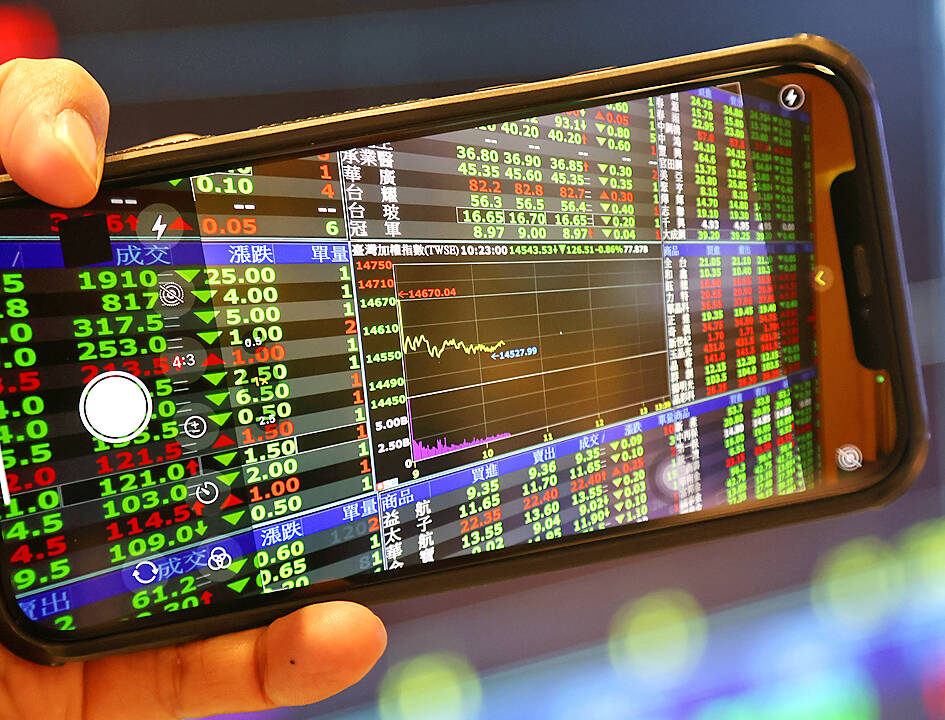The nation’s financial institutions reduced their investments in local and foreign stocks by NT$597 billion (US$19 billion) in the first seven months of this year, while increasing their bond holdings by NT$1.5 trillion, the Financial Supervisory Commission said on Thursday.
The moves came in response to global stock market routs and central bank rate hikes, the commission said.
As the US Federal Reserve is expected to raise key interest rates by another 75 basis points this month, local financial institutions are likely to continue to increase their bond holdings and cut stock positions, it said.

Photo: CNA
Taiwanese banks, insurance companies and securities firms had NT$3.1 trillion of local and foreign stocks as of the end of July, down NT$597.1 billion from the end of last year, the commission said.
Insurance companies in the first seven months invested NT$2.34 trillion in local and foreign stocks, compared with banks’ stock investment of NT$689.2 billion and securities firms’ NT$69 billion, it said.
Financial institutions’ combined bond holdings totaled NT$27.24 trillion as of the end of July, up NT$1.49 trillion from the end of last year, as central banks’ rate hikes drove up bond yields.
From January to July, life insurance companies increased their bond holdings by NT$904 billion, while banks boosted their holdings by NT$596.7 billion, the commission said.
Separately on Tuesday, the commission said an inspection found that 20 financial institutions had contravened credit control measures for real-estate financing set by the commission and the central bank.
The inspection of 10 banks, seven credit cooperatives and three bill financing companies found six major contraventions, the Financial Examination Bureau said.
The severest violations were related to the requirements on loan-to-value (LTV) ratio and the calculation of capital adequacy ratio, it said.
Three banks and one credit cooperative were found to have offered loans to home and land buyers with LTV ratios higher than the caps set by the central bank, the bureau said.
Four banks were found to have used incorrect risk weighting to calculate their assets, which resulted in higher capital adequacy, it said.
One bank and one credit cooperative were found to have lent funds to real-estate developers as working capital for salaries, rent and office overhead, whereas the funds were used in construction projects or for land purchases in contravention of banking rules, it said.
The bureau has demanded that the financial institutions correct their practices, and submitted its findings to the Banking Bureau and the central bank, which are expected to mete out fines soon, it said.
The commission said it has no plans to tighten regulations on real-estate financing by the end of this year and it expects financial companies to comply with the rules.

MULTIFACETED: A task force has analyzed possible scenarios and created responses to assist domestic industries in dealing with US tariffs, the economics minister said The Executive Yuan is tomorrow to announce countermeasures to US President Donald Trump’s planned reciprocal tariffs, although the details of the plan would not be made public until Monday next week, Minister of Economic Affairs J.W. Kuo (郭智輝) said yesterday. The Cabinet established an economic and trade task force in November last year to deal with US trade and tariff related issues, Kuo told reporters outside the legislature in Taipei. The task force has been analyzing and evaluating all kinds of scenarios to identify suitable responses and determine how best to assist domestic industries in managing the effects of Trump’s tariffs, he

TIGHT-LIPPED: UMC said it had no merger plans at the moment, after Nikkei Asia reported that the firm and GlobalFoundries were considering restarting merger talks United Microelectronics Corp (UMC, 聯電), the world’s No. 4 contract chipmaker, yesterday launched a new US$5 billion 12-inch chip factory in Singapore as part of its latest effort to diversify its manufacturing footprint amid growing geopolitical risks. The new factory, adjacent to UMC’s existing Singapore fab in the Pasir Res Wafer Fab Park, is scheduled to enter volume production next year, utilizing mature 22-nanometer and 28-nanometer process technologies, UMC said in a statement. The company plans to invest US$5 billion during the first phase of the new fab, which would have an installed capacity of 30,000 12-inch wafers per month, it said. The

Taiwan’s official purchasing managers’ index (PMI) last month rose 0.2 percentage points to 54.2, in a second consecutive month of expansion, thanks to front-loading demand intended to avoid potential US tariff hikes, the Chung-Hua Institution for Economic Research (CIER, 中華經濟研究院) said yesterday. While short-term demand appeared robust, uncertainties rose due to US President Donald Trump’s unpredictable trade policy, CIER president Lien Hsien-ming (連賢明) told a news conference in Taipei. Taiwan’s economy this year would be characterized by high-level fluctuations and the volatility would be wilder than most expect, Lien said Demand for electronics, particularly semiconductors, continues to benefit from US technology giants’ effort

‘SWASTICAR’: Tesla CEO Elon Musk’s close association with Donald Trump has prompted opponents to brand him a ‘Nazi’ and resulted in a dramatic drop in sales Demonstrators descended on Tesla Inc dealerships across the US, and in Europe and Canada on Saturday to protest company chief Elon Musk, who has amassed extraordinary power as a top adviser to US President Donald Trump. Waving signs with messages such as “Musk is stealing our money” and “Reclaim our country,” the protests largely took place peacefully following fiery episodes of vandalism on Tesla vehicles, dealerships and other facilities in recent weeks that US officials have denounced as terrorism. Hundreds rallied on Saturday outside the Tesla dealership in Manhattan. Some blasted Musk, the world’s richest man, while others demanded the shuttering of his